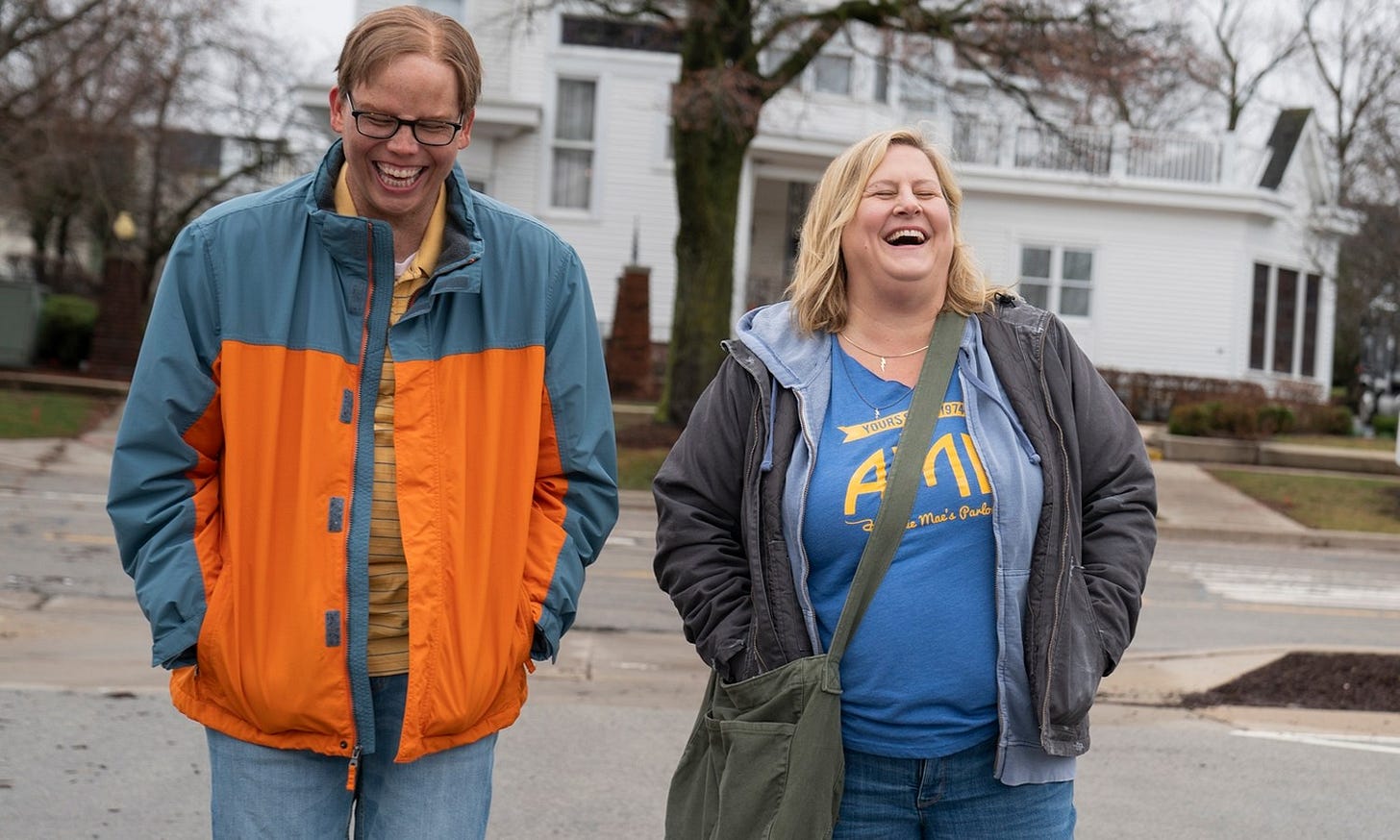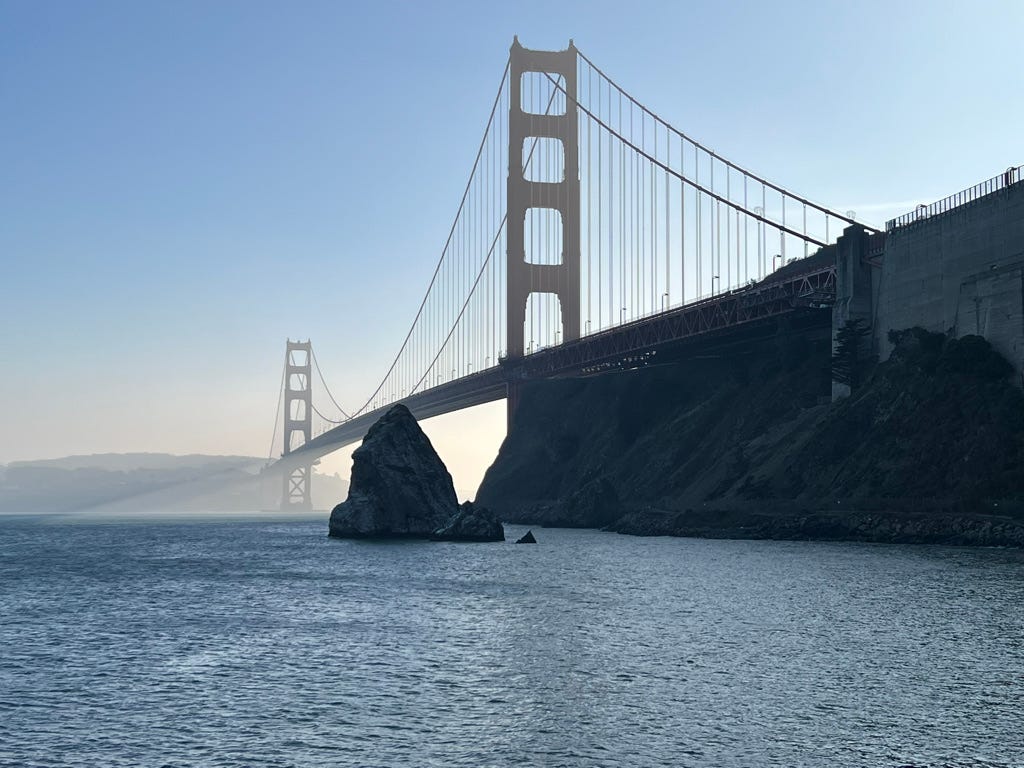I’m in love.
An unlikely love. An aching love. A sweet love. A nourishing love.
I’m in love with a friendship—the friendship of Sam (played by Bridget Everett) and Joel (played by Jeff Hiller) on the show Somebody Somewhere, which just concluded its third and final season.
I’m in love with their individual characters—Sam for her bigness in size and voice and feelings (and the bigness of her smile), and Joel for being who the New York Times describes as “a sweet, middle-aged, gay Richie Cunningham with a wry wit he saves for his friends and a dreamy optimism he pours into his homemade vision board.”
But the two of them together as friends forms a magnetic bond that is one of the most life-affirming things I’ve experienced in a long time.
In fact, the entire show Somebody Somewhere—an intimate, introspective show about people living ordinary lives in an ordinary small town—is one of the most life-affirming shows I can think of.
I thought Ted Lasso was the ultimate in jolly good cheer, but Somebody Somewhere has a depth and nuance that Ted Lasso doesn’t. A critic at Vulture defined Somebody Somewhere as being “a less formulaic, less sentimental, more grounded, and much sadder version of Schitt’s Creek.”
It certainly echoes Schitt’s Creek in celebrating small-town quirks and kooks, but it’s about something more; it’s about the bigness of our yearning, aching, creative souls—and what a difficult matter it is for us to find belonging and express ourselves. Especially if you’re “different” in a small town.
The small town the show takes place in is Manhattan, Kansas, and it’s a type of character in this show (and also where Everett grew up in real life). In fact, you might say it has as tough of a time belonging as its characters because our culture tends to look down on small-town life as unsophisticated, boring, and full of narrow-minded yokels.
I say this as one who grew up in a small town in Iowa. I have heard so many misguided, disparaging comments about small-town life over the years from big city people who are afraid to spend more than 15 minutes in a small town. Yet, at the same time, I have to confess that I’ve been guilty of similar snobbery because I’ve internalized a lot of those big city judgements in my own flight away from my roots.
Like Sam, I didn’t find belonging in my small town. And yet it’s my home. A home that’s a cauldron of both rootedness and alienation—the same existential state Sam finds herself in as she sleeps on a couch for all three seasons (such a great metaphor for her life).
Like Sam, I once returned to my small town as an adult in desperate straits and spent a year sleeping on people’s couches and wondering each day if I should sell my boyhood baseball card collection, my only possession of value at the time (I didn’t).
Sam is a gifted singer, but is full of self-hatred, and she only begins to find a new home when she finds Joel, a co-worker at the test center where she initially works, who was in high school show choir with her. She doesn’t remember him, perhaps because invisibility was a survival strategy for him. “It’s all good,” he says. “A lot of people don’t remember me.”
Joel treats her like the star he sees her as, though. When he invites her to “Choir Practice”—a semi-sanctioned cabaret soiree held after-hours in a mall church that draws gay residents and other free spirits from the community—she begins to find her voice and her place.
Art created with love
This is one thing I loved about the show: So much of the show’s drama revolves around its characters’ creativity and their need to express themselves. The show doesn’t ridicule their artistic endeavors or diminish them in any way, and the characters don’t dream of fame and fortune in their art—they just want to make things and put their voice into the world.
The reverence for the characters’ creative pursuits made me realize that this show is the perfect example of a work of art created with love—which is why I’m writing this. I’ve been writing a series of posts about “writing with love” to explore what that means after several authors mentioned it as the foundation of their creative approach on my Write-minded podcast, and this show is a tutorial in how to write with love.
In another’s hands, Somebody Somewhere would ridicule the small-townness of the people in Manhattan—but it elevates the characters by granting them their humanity, their creative drive, their need to take singing lessons and start wedding planning businesses and write love songs for new boyfriends.
Somebody Somewhere is a spot of gentleness in our hard world. A show about connection in a world that seems depleted of it—which is why it’s a radical show. It illuminates a humanity we often overlook in our widening divisions, a humanity we often don’t even begin to recognize.
Breaking rules: emotions matter more than plot
Beyond this, I like how the show breaks so many of our rules of storytelling by daring to disregard plot. It dares to linger on mundane but meaningful moments. Most TV scrubs out any scene that doesn’t move the story forward into a larger dramatic arc, and favors hooks that build tension, but Somebody Somewhere is content with indulging in the small but telling moments of life, the kooky intimacy of two friends bantering over drinks on the couch.
In fact, Sam and Joel’s friendship is a little like an extended sleepover that we get to watch, even when they “charmingly” get diarrhea at the same time—a scene riveting for the intimate drama of two friends sharing an “embarrassing” moment. Neither of them have a vulnerability hangover afterward, though. Because they love each other.
The show is also generous in spirit to characters who are easily viewed as antagonists. For example, Tricia, Sam’s sister, starts the show on a note of church-lady superiority, but she grows more multi-dimensional and sympathetic as the show progresses. People matter in Somebody Somewhere. They’re not stereotypes.
One of my favorite writers and Iowans, Lyz Lenz, wrote, “It would be so easy to make Trish a villain. To make the storylines of this show hinge on queer trauma or the pain of red-state politics. But nothing is so simple. Everything is just beautifully, heartachingly normal, hard, mean, and happy, all at once.”
Lenz makes the surprising point that most people in America live in these “middle places”—and most of the LGBTQ population lives there too: 63 percent of the LGBTQ population lives in the Midwest, mountain, and Southern regions of the country.
Who knew?
Lenz says:
“Maybe people come here because, like Sam, they’re returning home. But most of us live here because we love it. We love these complicated, beautiful church basements, overstuffed home-goods boutiques, our problematic Trishes and our delightful Joels, and our homes full of the ghosts of our past that we cannot escape, because we don’t want to. Instead, we sit down, invite them to Thanksgiving, and figure out a messy way of existing together.”
Figuring out a messy way of existing together. This is the purpose of all of art for me.
And the purpose of religion. It would have been so easy to make small-town religion a villain, to literally throw stones at it for its conservative leanings, but one of the big questions of the show is which church Joel feels most comfortable in. Characters go to church. They listen to the sermon. They think about the sermon.
Because religion helps them figure out this mess of existing together.
Why hast thou forsaken me?
At the beginning of the year, when I read the poet Christian Wiman’s “atheist Christian” writings, I focused on the statement, “God, why hast thou forsaken me?”—Jesus’s words on the cross. It is the most damning aloneness—to be cut off from the source of life itself—to not only not belong, but to be forsaken.
I can’t help but think we all live in such a terrified, confused state, feeling forsaken. And in feeling forsaken, knowing that there is only one remedy, one solace: the warmth of togetherness.
I’d never guess that when Sam and Joel “broke up” in season two when Joel finds love with the beautifully earnest, corny Brad that I’d sob on the couch like I was watching a tragic love story. It brings up such an interesting problem: how do we handle the “romantic” nature of our friendships—how do we handle their changes and endings?
The love of Sam and Joel’s friendship is as big as any romantic love, and any threat to it is equally tragic. Fortunately, they get back together, and the closeness of their “friendship love” even seems to buoy and support Joel’s romantic love.
The third and final season explores our need for romantic love as it shows Sam watching her friends couple up, and she feels the loneliness of being the third wheel. She thinks about adopting a dog, but in her lack of decisiveness, she loses out on the dog.
The final scene is triumphant in its strange, ordinary way, though. Sam is working as a bartender in a scruffy bar, and she’s invited her friends and her sister to spend time with her at the bar on a Sunday afternoon.
The big closing scene shows Sam belting the Miley Cyrus song “The Climb,” a song about celebrating journeys rather than destinations. And how fitting—that she’s just singing to her friends, the bar as big of a stage as she needs to make music, give music, be music.
What do any of us really need from our art than such a connection as this?
It turns out that life isn’t always about major transformations or breakthroughs or “making it.” Sometimes, it’s simply yearning for more and taking small steps to move forward.
Life will always be hard and Sam may never feel fully at home back home, but she can survive and be happy—at least as long as she has Joel.
And that’s where it ends with me: the love of their friendship, the love the creators had for the show, and the love I felt while watching it. I’m changed. I’m going to think of this show the next time I create anything. I hope I can pass on the love it’s given me.
Spare a dime to help me publish this newsletter?
The progression of a haiku
Here are three different versions of a haiku. Which one do you think is best?
All of the things He didn’t say— I hear them
Or …
All my father didn’t say— I now make hymns
Or …
All of the things My father didn’t say— I now make hymns
Because a quote
People in small towns, much more than in cities, share a destiny.
—Richard Russo
Because I also wrote about The Bear and creativity
The Bear is the one recent show other than Somebody Somewhere that I find myself thinking of often in order to understand this messy life—and understand creativity.
Because a photograph
I saw an old bridge from a new angle, and its beauty overwhelmed me. It’s a lesson for me to look at old things from new angles.







I haven't watched this, but will. There are so few good books and memories about friendship.
As for the haikus, I vote for this one:
All my father didn’t say—
I now make hymns
Oh Grant, this was beautiful. Thank you. I, too, love Somebody Somewhere and watching it nourishes my creative spark. I went to school in Kansas (Salina) and my WIP is set in Kansas. Kansas is not just a place, it's a state of being, of loving and giving, all of which you capture so completely.